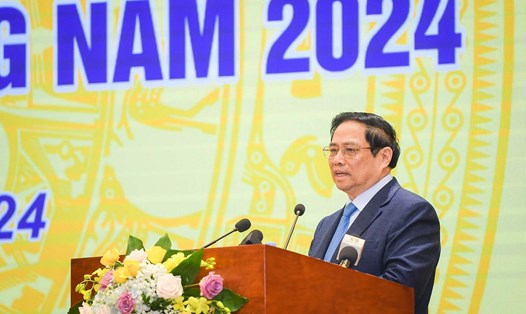Timely response to credit capital needs for the economy
According to statistics from the Department of Credit for Economic Sectors (State Bank), by the end of September 2024, the banking system had disbursed nearly VND 14.8 million billion to sectors in the economy. Credit is estimated to grow by 9% compared to the end of 2023, up 16.01% compared to the same period in 2023.
Efforts from boldly handing over all credit room to banks from the beginning of the year, to operating flexible monetary policies, in line with reality, creating conditions for credit institutions to proactively implement credit growth; continuing to resolutely implement credit programs and policies for industries and sectors according to the policies of the Government and the Prime Minister.
Statistics also show that credit for small and medium enterprises increased by 2.72%; credit for high-tech enterprises increased by 25.74%; credit for supporting industries increased by 18.06%...
In 2024, commercial banks actively participated in lending programs, such as the lending program for the forestry and fishery sectors: By the end of June 2024, commercial banks had disbursed loans with a cumulative turnover of about VND 35,400 billion, with nearly 9,900 customers borrowing capital, completing the total committed lending turnover of the Program (on a scale of VND 30,000 billion). Implementing the direction of the Government in Resolution No. 128/NQ-CP dated September 8, 2024, the current scale of the Program's implementation as registered by commercial banks has increased to VND 60,000 billion.
According to Circular 02/2023/TT-NHNN, by the end of August 2024, 72 credit institutions had restructured the debt repayment period and maintained the debt group for 290,370 customers with a total value of restructured principal and interest of VND 249,705 billion. These positive results help strengthen the belief that the target of 15% credit growth for the whole year is completely feasible.

Businesses benefit
Stable macroeconomic policy, controlled inflation, and continuously optimized output interest rates have created conditions for many businesses to develop.
As Mr. Le Ba Tien - a startup business owner in Dien Son commune, Dien Khanh district, Khanh Hoa province - said, within 4 years of starting his business, his small business received timely support from capital from Agribank Dien Khanh District Branch. The capital with preferential interest rates has helped his family expand production scale, create up to 25 bamboo products, meet 3-star OCOP standards and export some product lines.
Mr. Tien said that for many years, due to lack of capital, he could not invest and develop his products strongly. Mr. Tien's story is just one of many businesses and people who have accessed 14.8 million billion VND of capital from banks.
This year, in addition to joint efforts to push capital into the economy, the banking industry also had to focus on supporting about 124,000 customers affected by Typhoon Yagi.
According to statistics from 26 branches of the State Bank of Vietnam in provinces and cities, the number of these customers has an outstanding debt of about 192,000 billion VND, accounting for 3.1% of the total outstanding debt in the area.
The State Bank of Vietnam said that up to now, 35/40 banks have sent notices to the State Bank of Vietnam and announced at the Conference the scale of support of 405,000 billion VND for new loans and interest rate reduction, of which about 300,000 billion VND is reserved for new loans to restore production and business.
The interest rate reduction for existing loans is from 0.5% - 2%/year, the interest rate for new short-term disbursements is from 5% - 6.7%, and for medium and long-term loans is from 5.5% - 8%/year.
As one of the businesses that suffered heavy losses after Typhoon Yagi swept through Hai Phong, Mr. Hoang Xuan Hung - owner of a restaurant, hotel and transportation business in Do Son, Hai Phong City - was supported by the bank to reduce loan interest rates and extend debt repayment.
Mr. Hung said that after the storm, his company no longer had any assets to mortgage to the bank, so the only hope was for "self-reliance" from the company's shareholders. However, fortunately, the bank where Mr. Hung borrowed money supported him with a reduction in loan interest rates, debt extension, and guidance on new loan directions if needed.
"In difficult times, this is a great encouragement from the bank for our business," said Mr. Hung.
Fulfilling the role of a pillar for the economy
Assessing the monetary policy management of the State Bank this year, Dr. Chau Dinh Linh - lecturer at Banking University of Ho Chi Minh City - said that the State Bank has fulfilled its role as a pillar for the economy.
Dr. Linh assessed that in order to support and stimulate the economy, in recent years, the State Bank has kept the operating interest rate at a low level, contrary to other countries in the world. This is flexibility, reflecting the country's stance. And up to now, when the operating interest rates of other countries in the world have decreased, favorable conditions have also appeared and supplemented our country's interest rate policy up to the present time. This year, the exchange rate has also increased beyond the given range, but the operator has still coordinated smoothly, bringing the exchange rate back to stability.
Monetary policy management: Theory must be linked to practice
Sharing about the difficulties in managing monetary policy, Deputy Governor of the State Bank of Vietnam Dao Minh Tu said that after 2 years of being affected by the COVID-19 pandemic and especially in 2023 when we emerge from the pandemic, we will continue to face an extremely difficult period with many challenges. However, our economy can still stand firm. And managing monetary policy is one of the key reasons.
The Deputy Governor said that based on experience, the State Bank, under the direction of the Prime Minister, has operated monetary policy in a very flexible and practical manner.
"We do not deviate from or go beyond principles and theories, because what belongs to principles, we still have to respect its operating rules. But when operating the State Bank, we also closely follow the practical situation, because each country has different characteristics. As a result, the whole world increases interest rates, but Vietnam lowers operating interest rates" - said the Deputy Governor.











